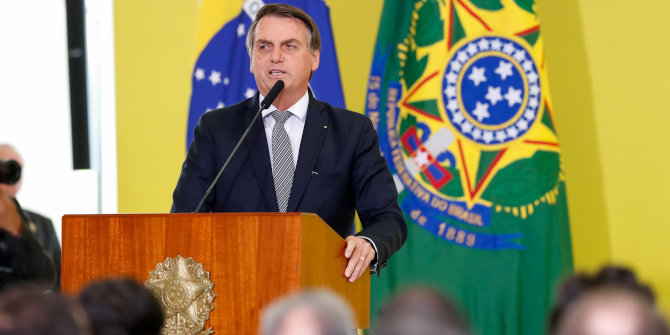Georgina Waylen argues that the reluctance of politicians with hypermasculine leadership traits to take the pandemic seriously and implement or adhere to mitigation measures led to incoherent policymaking and poor communication. This reduced levels of public trust and contributed to high rates of infection and death.
In his recent evidence to MPs, Dominic Cummings attributed many failings in the UK government’s initial pandemic response to ‘groupthink’. Others have highlighted the absence of women in top scientific and decision-making positions as a key part of the problem. However, not only was the government’s response male-dominated, but an important and neglected part of any explanation for its Covid-19 policy failures is the role of hypermasculine leadership – a form of exaggerated and dominant masculinity displayed in rhetoric, symbols, and behaviour like risk-taking and the use of militaristic language.
Recognising the implications of Prime Minister Boris Johnson’s hypermasculine leadership style helps us understand why lockdowns were delayed in the first and second phases of the pandemic; and other mitigation measures, like mask-wearing, were introduced only reluctantly and undermined by government ministers. The reluctance of hyper-masculine leaders to take the pandemic seriously, abandon their risk-taking behaviour, and implement or adhere to mitigation measures, led to incoherent policymaking as well as poor and confused communication, reducing levels of public trust and contributing to high rates of infection and death. As a result, the UK had one of the highest excess mortality rates of any developed country in the early stages of the pandemic and suffered a 20% fall in GDP in the second quarter of 2020.
Boris Johnson’s particular form of hyper-masculinity is an English white ruling class one. He presents himself as a benign and often comic English eccentric, defying authority with a disdain for rules, always with deliberately tousled hair signifying vivacity, rule-breaking, and chaos. It is also displayed in his combination of ‘boosterism’ (over-confident and unwarranted talking-up) and a libertarian reluctance to circumscribe individuals’ behaviour, all part of a political performance that combines ‘constant presumptuous mendacity, deliberate disdain for details and relentless performative optimism’. It is epitomised for some by his membership of the notorious Oxford upper-class drinking club, the Bullingdon.
It is therefore no surprise that to coordinate the pandemic response, Johnson surrounded himself with an all-male, mostly Oxbridge educated inner circle of cabinet ministers, as well as a male-dominated entourage of advisers in Downing Street (disparagingly dubbed ‘Dom’s frat house starring Caino, Roxster, Sonic and other playground names’). Even the government’s public face has been male dominated, with few women appearing at the frequent press conferences in the early stages of the pandemic as either ministers (Priti Patel was the only one and then only three times) or scientific advisers.
As a result of his refusal to take the threat of Covid-19 seriously, Johnson initially downplayed the outbreak, claiming on 3 March 2020 that the country ‘is extremely well-prepared’ because of the ‘fantastic NHS, fantastic testing system and fantastic surveillance of the disease’ so that the vast majority of people… should be going about our business as usual’. Johnson also continued with his risk-taking behaviour, refusing publicly in early March 2020 to adopt social distancing measures, and asserting after visiting a hospital that ‘I’m shaking hands continuously… I shook hands with everybody and I continue to shake hands’.
Once the seriousness of the pandemic could no longer be denied, the government’s rhetoric used explicit militaristic narratives of the ‘war against Covid’. Johnson declared that ‘we must act like any wartime government and do whatever it takes to protect our economy… yes this enemy can be deadly but it is also beatable and we know how to beat it’. A study of ten male and female leaders’ speeches, found that Johnson’s had the third highest number of military references (just behind India’s Prime Minister, Narendra Modi). The Second World War, in particular, was frequently evoked by government ministers with talk of the ‘blitz spirit’ and a ‘call to arms’.
This over-weaning self-confidence, disdain for rules, and faith in English exceptionalism, translated into a reluctance to implement or adhere to mitigation measures, delaying the implementation of effective policies to combat the pandemic. Of particular significance are the disastrous consequences of delaying lockdowns in comparison to other European countries. Neil Ferguson, a leading UK scientist, argued that locking down only one week earlier would have halved the first wave’s death toll. The same mistakes were then repeated later in the year.
Johnson and his inner circle displayed a similar reluctance in the symbolically charged arena of mask-wearing, despite increasing evidence of its efficacy. Masks, particularly in the United States, have become part of ‘culture wars’ seen as both unwarranted government interference and a sign of weakness and lack of manliness, leading former Vice President Dick Cheney’s daughter to tweet a picture of him in one with the hashtag ‘realmenwearmasks’). Masks only became mandatory in shops in England on 24 July 2020 (in contrast to France where this happened on 10 May); and Johnson himself did not appear publicly in one until 9 July, when the announcement was first made. Even then, Gove pronounced two days later that mask wearing should not be compulsory, only ‘encouraged’, adding to the confused and contradictory messaging.
The list of other early Covid-19 policy failures is extensive: the promised ‘world-beating’ test and trace system run by the private sector did not materialise, and neither did a British ‘world beating’ contact-tracing app. Johnson’s invocation that British manufacturers with no experience should produce ventilators (likened to the production of spitfires in World War Two) which he jokily dubbed ‘operation last gasp’, also came to nothing. All this occurred amid countless allegations of cronyism and corruption, as contracts to produce personal protective equipment were awarded to close contacts with no experience in this field.
Of course, the many failures of the early pandemic response also have to be seen in the context of an institutional decline marked by over-centralisation, declining state capacity, and outsourcing, exacerbated by a decade of austerity after the global financial crisis that had significantly increased levels of inequality. Huge cuts in public spending have hollowed out both the local and national state, contributing to a significant decline in health and welfare provision. The NHS lacked capacity and the pandemic planning was revealed to be woefully inadequate.
Finally, we have to recognise that Johnson is not alone in having a hypermasculine leadership style that affected his response to Covid-19. He shares characteristics with other right-wing populist leaders, including Narendra Modi in India, Donald Trump in the United States, and Jair Bolsonaro in Brazil. Johnson’s populist nativism is a white English nationalism, evoking a glorious Imperial past. He was elected on a populist promise to enact the will of the people to ‘get Brexit done’ in the face of opposition from the liberal metropolitan elites.
All these right-wing populist hypermasculine leaders performed poorly in their efforts to deal with the pandemic by refusing to take it seriously, continuing risk-taking behaviour, and delaying and undermining mitigation measures. Understanding what went wrong with the pandemic responses of leaders like Boris Johnson, with hypermasculine leadership styles, is an important part of avoiding similar disastrous mistakes in the future.
For more information, see the author’s accompanying paper in the Journal of European Public Policy
Note: This article originally appeared at our sister site, British Politics and Policy at LSE. It gives the views of the author, not the position of EUROPP – European Politics and Policy or the London School of Economics. Featured image credit: Simon Dawson / No 10 Downing Street (CC BY-NC-ND 2.0)





